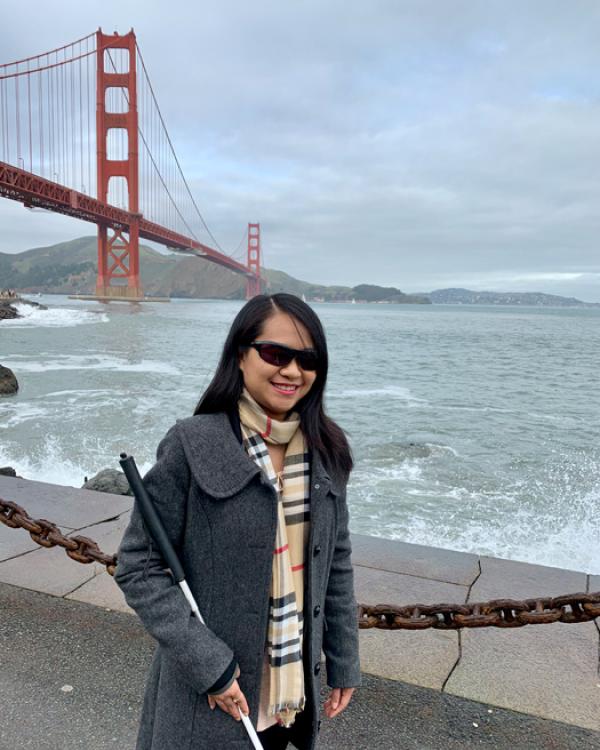
To say that Department of Education doctoral student Ann Wai-Yee Kwong is a passionate advocate in the fight for inclusive education (and work places) is practically an understatement. Last year she was invited to give two talks at the Forum on Workplace Inclusion in Minneapolis, with over a thousand attendees and Magic Johnson as their keynote. “I was invited because of my ability to bridge research and practice for educators and employers,” she says. So she took part in a main-stage panel, “The Abilities Spectrum: Accelerating Inclusion in the Age of Tech,” and gave a solo spotlight session, “Recognizing One’s Inclusion ‘Blind Spot’: How Language Can Challenge Internal Assumptions and Cultivate Inclusive Ecologies.”
Currently Kwong is not only progressing with her qualifying exams but is also working fulltime as a transition program specialist in San Francisco at LightHouse for the Blind and Visually Impaired. “I design and implement programming for work readiness skills and exploration of career pathways,” she explains, pointing out that it’s often difficult for individuals with disabilities to make the move from a segregated environment such as sheltered workshops to a competitive and inclusive one. She helps lead both weekend workshops and a four-week summer academy that uses experiential and immersive learning, and according to the LightHouse website, “emphasizes the vocational enrichment of low vision and blind youth, providing access to a multifaceted array of mentorship, employment readiness skills, and alternative accessible techniques.”
Her goal, then, will be for her dissertation “to examine the efficacy of these strategies and the systemic attitudes surrounding employment preparation.” She particularly plans on focusing her research and work on transition-age youth (16-24), specifically on how students and families from cultural and linguistically diverse backgrounds gain access to critical services during this transition period where her personal lived experience as a blind woman who emigrated from Hong Kong catalyzed her passion.
Kwong, who received her B.A. in Psychology and a minor in Education from UC Berkeley as a Gates Millennium scholar, has long been working to make things better for disability communities. In 2014 she testified at a U.S. Senate hearing to advocate for herself and others, informing policy makers of the attitudinal and tangible societal barriers that limit the potential of people with disabilities and arguing for changes to Social Security rules and Department of Rehabilitation (DOR) attitudes. One point that she stressed to the committee: “I found it imperative that instead of discouraging me from pursuing higher education with bleak statistics, my DOR counselors should have empowered me with knowledge and confidence to realize my full potential.” When Kwong was finished, Committee Chair Senator Tom Harkin replied, “You’re very impressive. I’m going to suggest you think about taking up motivational speaking, too, because you’re a great speaker.”
She instead has opted to enhance her work in the macro view with the micro when considering how best to support those with disabilities. “I’m moving from 5000 miles away to five feet away,” she says, “where I can really understand how I can translate research to a moment with a student sitting right in front of me. There are a multiple array of factors I have to consider outside of a controlled environment.”
That’s one of the reasons she’s currently 325 miles from the UCSB campus in San Francisco. “The Bay area provides the opportunity to work with populations from culturally and linguistically diverse backgrounds,” she points out. Of course, she’s also already communicating with her advisor, Dr. Mian Wang, electronically, since he’s also been away from the Gevirtz School, serving as the Faculty Director of the University of California Education Abroad Program China Programs for the last two years. “Dr. Wang is working on topics near and dear to his heart, positive behavioral support in cultural context and family and professional partnerships, in China with the communities he’s involved with,” Kwong explains, “Just as I am doing here in San Francisco, with communities to which I passionately advocate with and for.”